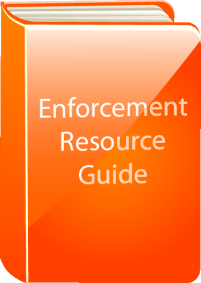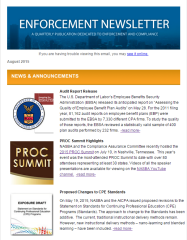Enforcement NewsletterAugust 2015The Enforcement Resource Guide (ERG) divides the enforcement process into nine basic components. In this newsletter, we will focus on Component 8: Recording and Publicly Reporting Decisions and Sanctions.
The Accountancy Licensee Database (ALD) is the central repository of current licensee and firm records and information. The ALD is hosted by NASBA and access to the system is free and limited to only authorized State Board Executive Directors and Board staff. The ALD is useful for exam grades and license verification when processing CPA license applications, but it is also a key component for enforcement efforts both at the state level and nationwide. By publishing disciplinary and enforcement information in the database, State Boards can have access to a single source to find out if a licensee has ever had action taken against him/her by another State Board. The disciplinary information provided to the ALD is used to trigger alerts that are sent from the system to State Boards. When a CPA’s license is revoked for disciplinary reasons in a state that participates in the ALD, an email alert is sent to all other states where the individual holds a license notifying them that there has been action taken against the licensee in another state. NASBA has worked closely with its member Boards to design and launch CPAverify, a public-facing version of the ALD. With the wide-spread adoption of mobility, the need for consumers of accounting services to be able to determine if a person or firm is licensed and in good standing is more prevalent than ever. The information in CPAverify is fed over from the ALD system, but only limited data elements are published. The amount of information available to the public in CPAverify is very limited compared to the comprehensive data available to boards in the ALD. CPAverify users are encouraged to contact the State Board directly to get the full details about an action that shows up in a licensee’s history. Only Boards with a data set that links are eligible to receive these disciplinary email alerts, since the feature relies on the linking function to recognize the same licensee across jurisdiction lines. Some boards have the capability of publishing disciplinary information or documents on their own web sites. A Board may be authorized to post a general public notice indicating that information on Board orders and other sanctioning agreements is available under the state’s Public Records Act, Freedom of Information Act or Public Disclosure Act by contacting the Board’s office. Some Boards can post the actual disciplinary orders for review. In addition to electronic publication, some Boards will provide notice to the AICPA, state societies, other jurisdictions, the Complainant, and through newspaper publication. The method of publication and extent of details that can be shared are determined by the Board’s public records laws of its state. If you have any information or samples you would like included in the Guide, please forward them to Stacey Grooms at [email protected] The Enforcement Resource Guide is available to current executive directors and members of Boards of Accountancy through NASBA.org. Any questions regarding the guide should be directed to Stacey Grooms at [email protected]. |
Full Newsletter |








